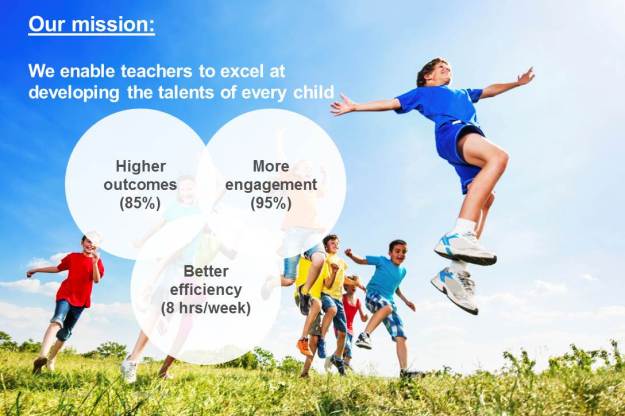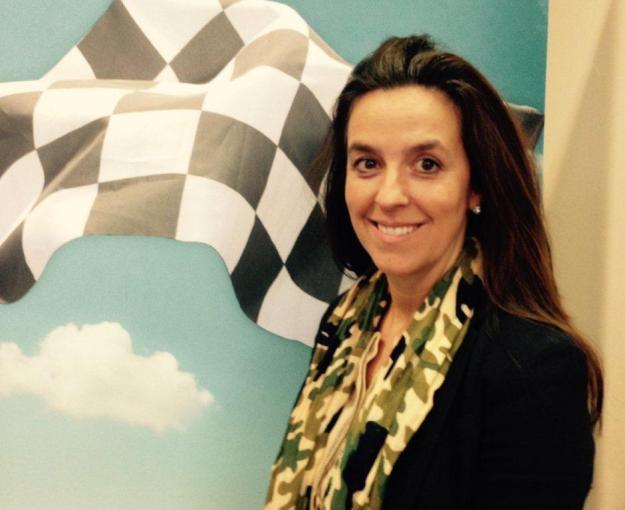
“There’s a real chance that more or less all schoolchildren everywhere will have access to mobile devices by 2050 and will be allowed to use those devices for learning. Imagine the profound impact on our people and planet when that generation gets access to mobile learning across the globe.” — John Martin
Check out my interview with leading education blogger and author C.M. Rubin, published in the Huffington Post earlier this week. I’ve re-posted it below:
Preparing our students for a new world of Innovation is a theme we cover consistently in The Global Search for Education series. We invited John Martin, CEO of Sanoma Learning, to share his vision for learning in the future.
Sanoma Learning has major markets in Belgium, Finland, the Netherlands, Poland and Sweden, where the company is fast replacing the traditional textbook model by developing innovative, captivating media in multiple platforms that can be individualized to meet the demands of specific educational systems. Sanoma has been dedicated to education since 1889, when it established the newspaper Päivälehti in Finland. Today it is carrying this commitment in leaping bounds into the future. Martin believes that while the teacher remains “the killer app,” edtech can personalize learning pathways for pupils and engage them in new ways, helping to develop the talents of each child. In my interview with John that follows, he shares his broad insights into how we can work towards environmental sustainability, global inclusivity, and intelligent technological adaptation in future classrooms.
How will the school of the future be more environmentally conscious?
I imagine myself as a biology teacher in a school where we have introduced “phenomenon-based learning”, inspired by the world renowned Finnish education system. I’m coaching a course on climate change and teams in my class are working out how to reduce the carbon footprint of the school. I’m sure they will find new ideas and expect this way of learning will have a profound effect on their behaviour too. An earlier class encouraged us to embrace the Internet of Things in helping to limit our environmental impact. Through this network of “connected things” at school, we have reduced our use of energy, water and food, and optimized the travelling. By changing our behaviour and embracing technology we are making a difference.

“By automating workflows and giving insights, technology will super-charge the teacher as the killer app in education. As the digital infrastructure of schools matures, usability will improve too.” — John Martin
How will the school of the future be more globally inclusive?
I expect that changes in demography, improved access to mobile technology and new norms in the classroom will open up the world of learning. Today, access to mobile learning is limited in three dimensions: to children in richer communities, in rich countries, and in schools where digital learning is encouraged. Consider the world in 2050 where the number of under 15 year olds will be roughly as follows: 70 million in the USA, 90 million in South America, 110 million in Europe, 200 million in China, 300 million in India and 700 million in Sub-Saharan Africa. There’s a real chance that more or less all schoolchildren everywhere will have access to mobile devices by 2050 and will be allowed to use those devices for learning. Imagine the profound impact on our people and planet when that generation gets access to mobile learning across the globe. Is there a more powerful instrument for reducing poverty and inequality, and laying the basis for sustained economic growth and sound governance than this?
How will technology be integrated into the curriculum and how will the school handle the integration of continual advancements in technology?
Technology will be seamlessly integrated into the curriculum and will enable ever improving learning impact. Through personalization, technology will help each individual pupil to achieve their best learning potential. And by automating workflows and giving insights, technology will super-charge the teacher as the killer app in education. As the digital infrastructure of schools matures, usability will improve too. Teachers will be better skilled and more confident than today in deploying technology and will be supported by more advanced ICT departments.
What will be left of traditional craft work and writing?
Partly as a reaction to all things virtual, the “maker” culture will flourish, with pupils and teachers embracing learning-by-doing. Unfortunately, handwriting might eventually become more or less out of fashion, except as an art form. But expression through words will be as essential as ever.

“Handwriting might eventually become more or less out of fashion, except as an art form. But expression through words will be as essential as ever.” — John Martin
Given the new trends of museums and corporate architecture integrating technology and media into their physical space and infrastructure, will schools evolve in a similar way?
I think the integration of technology with the pupil rather than the building is a more interesting development. With mobile devices and wearable technologies, new “Strava’s of learning” will help pupils to unlock their potential. Regarding the physical spaces in schools, I imagine it won’t be very long before screens and 3D printers are ubiquitously available in rich economies.
Given the efficiency of the Internet and home learning, how much time will students be needed in school?
The institution of the school is an important but arguably somewhat weak intervention in the holistic development of our children – after all, in most Western countries, about 80% of their time is spent outside the school. However, schools do offer scale benefits for learning, especially with regard to access to great teachers, learning resources, and to other pupils. Not to forget the added economic benefit of enabling parents to participate in the workforce. In some ways I wonder if a better question might be how we could more effectively look holistically at the learning and welfare of each pupil, rather than how many hours they should go to school?
How important will the presence of physical teachers be?
I believe the teacher is the killer app in education. A great teacher is like a great coach who can help to unlock the potential of each child. Generally, I think it’s best to physically include a teacher in the journey of learning. I don’t think this always has to be in the form of one teacher with 25 pupils; varying the group size and role of the teacher, depending on the situation, is likely to become more common in the future. Some of the tasks of a teacher will probably be made more efficient or even substituted by technology. And there are situations, for example, in case of a shortage of teachers or lack of access to a school, health matters or a wish to learn independently, where a virtual approach would make good sense.

“With mobile devices and wearable technologies, new ‘Strava’s of learning’ will help pupils to unlock their potential.” — John Martin
Will technology advancement lead to further personalization of education to individual students or will it also increase the techno-bureaucratic need for standardization?
Technology will surely enable the personalization of learning and I would expect that this will result in improved learning outcomes, better engaged pupils and a more efficient school. Whether or not this leads to more bureaucracy and standardization is up to the policymakers. Technology is in itself neither good nor bad but will serve the requirements of the market.
Will we teach students specific “subjects” in traditional classrooms like we have today or will classes be more about integrated/hybrid learning?
I expect the industrial model of education will be re-imagined and re-designed for the post-industrial, knowledge era. It’s a personal view on the future, but I wonder if we will move in the direction of a “T-model” in the next generation. In the vertical of the “T,” each child develops expertise on key “subjects,” but in a much more personalized way than at present – for example, also including adaptive and peer-to-peer learning. And in the horizontal of the “T”, other skills such as collaboration, communication and leadership are learned, maybe in the form of “phenomenon-based learning” programs such as those recently introduced in Finland.
Faced with increasing time spent on digital devices, how can we teach more practical skills, including coping with stress levels and interpersonal conflict?
It was hard to develop “life skills” from a book and the same holds true with devices. The thing about skills is that they generally improve with practice, especially when supported by coaching. So I think it’s a matter of prioritization: don’t over-do the screen time and make sure life skills are on the agenda.

C. M. Rubin and John Martin
(All Photos are courtesy of Sanoma)
Join me and globally renowned thought leaders including Sir Michael Barber (UK), Dr. Michael Block (U.S.), Dr. Leon Botstein (U.S.), Professor Clay Christensen (U.S.), Dr. Linda Darling-Hammond (U.S.), Dr. MadhavChavan (India), Professor Michael Fullan (Canada), Professor Howard Gardner (U.S.), Professor Andy Hargreaves (U.S.), Professor Yvonne Hellman (The Netherlands), Professor Kristin Helstad (Norway), Jean Hendrickson (U.S.), Professor Rose Hipkins (New Zealand), Professor Cornelia Hoogland (Canada), Honourable Jeff Johnson (Canada), Mme. Chantal Kaufmann (Belgium), Dr. EijaKauppinen (Finland), State Secretary TapioKosunen (Finland), Professor Dominique Lafontaine (Belgium), Professor Hugh Lauder (UK), Lord Ken Macdonald (UK), Professor Geoff Masters (Australia), Professor Barry McGaw (Australia), Shiv Nadar (India), Professor R. Natarajan (India), Dr. Pak Tee Ng (Singapore), Dr. Denise Pope (US), Sridhar Rajagopalan (India), Dr. Diane Ravitch (U.S.), Richard Wilson Riley (U.S.), Sir Ken Robinson (UK), Professor Pasi Sahlberg (Finland), Professor Manabu Sato (Japan), Andreas Schleicher (PISA, OECD), Dr. Anthony Seldon (UK), Dr. David Shaffer (U.S.), Dr. Kirsten Sivesind (Norway), Chancellor Stephen Spahn (U.S.), Yves Theze (LyceeFrancais U.S.), Professor Charles Ungerleider (Canada), Professor Tony Wagner (U.S.), Sir David Watson (UK), Professor Dylan Wiliam (UK), Dr. Mark Wormald (UK), Professor Theo Wubbels (The Netherlands), Professor Michael Young (UK), and Professor Minxuan Zhang (China) as they explore the big picture education questions that all nations face today.
The Global Search for Education Community Page
C. M. Rubin is the author of two widely read online series for which she received a 2011 Upton Sinclair award, “The Global Search for Education” and “How Will We Read?” She is also the author of three bestselling books, including The Real Alice in Wonderland, is the publisher of CMRubinWorld, and is a Disruptor Foundation Fellow.














